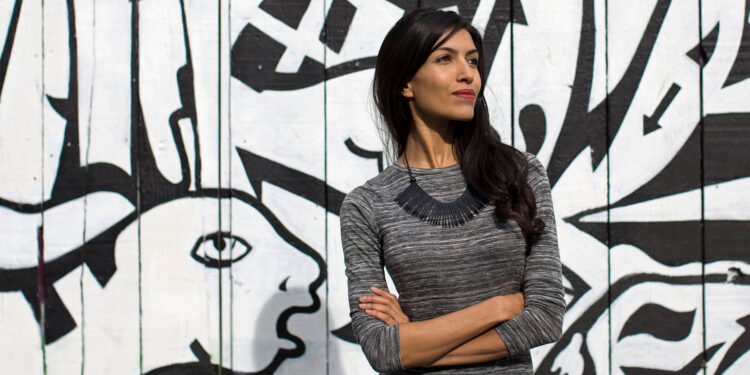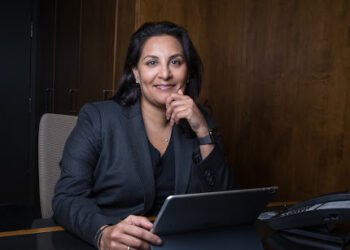What if the most powerful tool to fight poverty isn’t charity, but meaningful work? This question drove one visionary leader to reshape how we think about economic justice.
Leila Janah emerged as a pioneering social entrepreneur who believed in “give work, not aid.” She founded Samasource and LXMI, companies dedicated to creating dignified jobs for people in poverty-stricken regions.
Born in New York and raised in California, she leveraged her Harvard education in African Development Studies to build impactful organizations. Her ventures focused on providing training and skills that opened doors to the formal economy.
Throughout her life, she demonstrated that business could be a force for good. Her work created thousands of jobs while addressing critical issues like health and education in developing communities.
Key Takeaways
- Leila Janah founded Samasource and LXMI with a mission to alleviate poverty through job creation
- Her “give work, not aid” philosophy challenged traditional approaches to economic development
- She leveraged her education and experience to build socially-conscious business models
- Her companies provided skills training that helped people enter the formal economy
- She demonstrated how business could address global issues like poverty and inequality
- Her work created meaningful employment opportunities in underserved communities
- She left a lasting impact on how we think about social entrepreneurship
Introducing Leila Janah: A Visionary for Economic Opportunity
Economic dignity through meaningful employment became her driving passion. This visionary entrepreneur saw work as the ultimate solution to global poverty.
She believed creating dignified jobs represented humanity’s greatest challenge. Her philosophy centered on providing opportunity rather than charity.
In 2008, she launched Samasource to address economic disparities. The company connected marginalized workers to the digital economy.
Samasource trained people in AI data annotation skills. This training opened doors to living-wage positions with major corporations.
Fortune 100 companies like Microsoft and Walmart became partners. They provided data work that transformed lives in impoverished regions.
Her early experience witnessing poverty in Ghana shaped this mission. She understood that sustainable change required economic inclusion.
The model combined social impact with business sustainability. It demonstrated how enterprises could address poverty effectively.
Her work expanded through Samaschool and Samahope initiatives. These ventures provided digital skills training and healthcare access.
Operations spanned East Africa, India, and other developing regions. Thousands gained entry into the formal economy through her vision.
This lifelong dedication to economic justice created lasting change. Her innovative approach redefined social entrepreneurship for generations.
Early Life and Formative Experiences
A childhood of financial challenges shaped her understanding of economic struggle. Growing up in California as the daughter of Indian immigrants, she learned the value of hard work early.
She took on jobs like babysitting and tutoring during her school years. These experiences taught her the dignity that comes from earning one’s living.
Education and Global Perspective
At seventeen, she received a life-changing scholarship opportunity. This award sent her to Ghana for six months to teach English.
The time in Africa exposed her to extreme poverty firsthand. She witnessed how limited opportunities affected people’s lives.
This experience sparked her passion for African development work. It planted the seeds for her future mission-driven career.
She attended Harvard University, creating her own specialized degree. Her studies focused on African Development Studies.
During college, she conducted fieldwork across multiple African nations. She worked in Mozambique, Senegal, and Rwanda.
She also gained experience with the World Bank during this period. These opportunities broadened her understanding of global economic systems.
The Mumbai Call Center Inspiration
After graduating in 2005, she joined Katzenbach Partners as a consultant. Her assignments focused on healthcare and outsourcing companies.
One project involved managing a call center in Mumbai. This experience would become pivotal in her career journey.
While working at the center, she met a worker from Dharavi slum. This encounter revealed the incredible talent existing in impoverished communities.
She saw how global companies needed quality work done. Meanwhile, skilled people in slums lacked access to these opportunities.
This realization sparked the innovative idea for Samasource. She envisioned connecting local talent with global digital work.
These formative experiences built the foundation for her mission-driven career. They shaped her unique approach to fighting poverty through work.
Leila Janah’s Mission: Give Work, Not Aid
Traditional charity models often create dependency rather than empowerment. This visionary entrepreneur championed a different approach focused on economic dignity.
Her philosophy centered on creating sustainable opportunities. She believed meaningful employment offered the most powerful solution to global challenges.
This core mission drove the creation of multiple ventures. Each organization addressed different aspects of economic inclusion and access.
Samasource: Impact Sourcing for AI Data
Founded in 2008, Samasource pioneered impact sourcing for the digital age. The company connected talented people in impoverished regions with global technology work.
Workers received training in AI data annotation and basic computer skills. This training opened doors to living-wage positions previously unavailable in their communities.
Major technology companies became clients, including Google, Microsoft, and Walmart. These partnerships provided sustainable data work that transformed lives.
The model demonstrated that commercial success and social impact could coexist. It proved that talent exists everywhere, opportunity does not.
Samaschool: Digital Skills Training
Launched in 2013, Samaschool addressed the growing digital skills gap. The program initially operated in both the United States and Kenya.
Training focused on digital literacy and freelancing capabilities. Participants learned skills relevant to the emerging gig economy.
The curriculum evolved from competitive digital work preparation to broader economic readiness. This adaptation reflected changing market demands and opportunities.
Thousands gained practical experience through the program. They developed skills that increased their earning potential and economic mobility.
Samahope: Medical Treatment Crowdfunding
Health access became another critical component of the mission. In 2012, Samahope launched as a crowdfunding platform for medical treatments.
The platform specifically focused on women and children in poor communities. It connected donors directly with individuals needing critical care.
This innovative approach addressed healthcare gaps in underserved regions. It provided life-changing treatments that otherwise remained inaccessible.
In 2015, the organization merged with Johnson & Johnson’s CaringCrowd platform. This merger expanded reach and improved operational efficiency.
Together, these ventures created a comprehensive approach to economic and health challenges. They demonstrated how innovative models could address complex global issues.
LXMI: Ethical Luxury and Social Enterprise
Luxury beauty met social impact when this visionary launched her next venture. In 2015, she co-founded LXMI, a for-profit skincare brand with deep purpose.
The name drew inspiration from Lakshmi, the Hindu goddess of beauty and prosperity. This connection reflected the brand’s mission to create abundance through ethical business.
LXMI operated as a social enterprise incubated within the Sama organization. This structure ensured alignment with the core mission of creating economic opportunity.
The company focused on high-quality skincare products using ethically sourced ingredients. It provided work for women in developing regions who harvested these natural resources.
This venture represented an expansion beyond digital work into consumer goods. The founder believed business could drive positive change across multiple industries.
LXMI maintained transparency about its sourcing and impact practices. Customers could see how their purchases supported sustainable livelihoods.
The ownership model allowed Sama to benefit from potential dividends or acquisition. This created financial sustainability for the parent organization’s social programs.
Through LXMI, she demonstrated how luxury and ethics could coexist beautifully. The brand became a leader in the ethical beauty space during its time.
This experience built upon her previous work in economic development. It showed how social entrepreneurship could adapt to different market opportunities.
The company’s approach reflected her broader vision for business as a force for good. It proved that conscious consumerism could create meaningful change in the world.
Recognition and Legacy
Her innovative approach to social entrepreneurship earned global recognition. This visionary leader received numerous honors for her groundbreaking work.
She transformed how we think about business and social impact. Her legacy continues through ongoing initiatives and research.
Awards and Honors
In 2014, she received the prestigious Heinz Award in Technology, the Economy and Employment. This honor recognized her innovative poverty solutions.
The World Economic Forum named her a Young Global Leader. This distinction highlighted her influence on global economic issues.
She served as a Director of CARE USA, focusing on women’s empowerment. Her leadership extended beyond her own companies.
Hillary Clinton presented her with the Secretary’s Innovation Award. This recognized her exceptional contributions to social change.
Major publications featured her groundbreaking work. Elle Magazine included her in their “Women in Tech” list.
Forbes selected her for their influential “30 Under 30” recognition. These honors celebrated her early career achievements.
Continuing Impact Through Research
In January 2020, she passed away at age 37 after a courageous battle. Epithelioid sarcoma, a rare cancer, claimed her life.
Even during her health struggle, she contributed to medical research. She partnered with Research to the People to study her condition.
The organization conducted a medical hackathon analyzing her cancer case. This innovative approach advanced treatment understanding.
Her genome sequencing and tissue analysis provided valuable data. This information continues to benefit sarcoma research today.
Her foundation maintains her commitment to economic justice. The organization supports ongoing poverty alleviation efforts.
Her philosophical contributions reshaped social entrepreneurship thinking. The “give work” philosophy influences new generations.
Ethical business practices remain central to her enduring legacy. Companies worldwide continue adopting her impact-driven models.
Conclusion
Her legacy proves that sustainable change comes from empowering people with opportunity rather than handouts. Leila Janah’s companies transformed over 65,000 lives through dignified work in the digital economy.
Samasource continues her mission in AI data solutions, while her other ventures created pathways out of poverty. The “give work” philosophy remains highly relevant today.
Her innovative approach blended social mission with business success. She pioneered impact sourcing that provided skills training and living-wage jobs.
Support her enduring vision through engagement with organizations continuing this vital work. Economic inclusion remains our most powerful tool against global poverty.
FAQ
What is the core philosophy behind Leila Janah’s work?
The core philosophy is “Give Work, Not Aid.” She believed that providing dignified, digital work is a more sustainable and empowering solution to global poverty than traditional charity. This approach focuses on building skills and creating economic opportunity.
What is Samasource and what does it do?
Samasource is a social enterprise that provides data annotation and labeling services for artificial intelligence and machine learning. It connects people living in poverty to digital work, such as tagging images and transcribing audio, for major tech companies.
How did a call center in Mumbai inspire her business model?
While visiting a call center in Mumbai, she observed that even workers from the city’s slums could perform complex tasks for international clients. This proved that talent is universal, but opportunity is not, forming the basis for her impact sourcing model.
What other organizations did she found alongside Samasource?
She also founded Samaschool, which provides digital skills training to prepare people for the modern economy, and Samahope, a crowdfunding platform that connected donors to fund critical medical treatments for individuals in need.
What was the purpose of the luxury skincare brand LXMI?
LXMI was created as an ethical luxury brand that sourced its ingredients, like rare Nilotica nuts, from women-led cooperatives in East Africa. It provided living wages to marginalized producers, blending social impact with a high-end business model.
What is her lasting legacy in the field of social enterprise?
Her legacy is a proven model for “impact sourcing” that demonstrates businesses can be both profitable and transformative. She inspired a movement focused on using market-based solutions to create jobs and reduce poverty globally.





